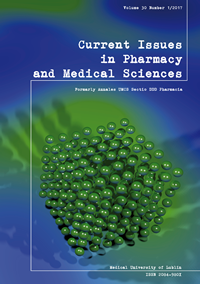Systemic treatment of Krukenberg tumors
DOI:
https://doi.org/10.1515/cipms-2017-0033Keywords:
Krukenberg tumor, chemotherapy, treatment, surgery, metastasis, ovarian cancerAbstract
Of all ovarian tumors with distinct biological features, 10-25% are secondary ovarian tumors. Among the most common cancers that cause ovarian metastasis are breast cancer, colorectal cancer, endometrium, as well as gastric and lateral cancer. Krukenberg tumors remain asymptomatic until the tumor reaches a certain size, as in the case of primary ovarian cancer. Symptoms are non-specific: abdominal pain (42%), postmenopausal bleeding (18%), weight loss (6%) and an increasing abdominal girth (15%). Diagnostic procedures should include physical examination, basic blood and biochemistry tests, radiographic imaging and endoscopy. There are currently no uniform guidelines to be followed in order to treat this cancer. However, the survival rate of selected subgroups of patients may be enhanced by means of cytoreductive surgery (performable among patients with good general health condition), where the metastases are limited only to the ovaries, where the primary tumor is derived from the colorectal cancer, and where there is the absence or minimal residual disease. It is still controversial to use adjuvant chemotherapy following the metastasectomy of Krukenberg tumors. Although this type of treatment seems to provide a survival benefit, there are currently no randomized prospective trials available so as to confirm or deny. Future research should, therefore, be focused on the potentially synergistic effect of surgery and perioperative administration of cytotoxic therapies targeted at high response rates. Studies on new molecularly targeted drugs can also be beneficial.
References
1. Moghazy D, Al-Hendy O, Al-Hendy A. Krukenberg tumor presenting as back pain and a positive urine pregnancy test: a case report and literature review. J Ovarian Res. 2014;7(36):1-4.
2. Jeung YJ, Ok HJ, Kim WG, Kim SH, Lee TH. Krukenberg tumors of gastric origin versus colorectal origin. Obstet Gynecol Sci. 2015;58 (1): 32-39.
3. Vakili SM, Sharbatdaran M, Noorbaran A, Siadati S, Moslemi D, Shafahi S. A case of colon cancer with breast metastasis and Krukenberg tumor. Int J Hematol Oncol Stem Cell Res. 2014;8 (1):46-50.
4. Lama D, Ong E. The role of surgical excision for the Krukenberg tumour: A case report. Int J Surg Case Rep. 2017;38:185-188.
5. Matsushita H, Watanabe K, Wakatsuki A. Metastatic gastric cancer to the female genital tract (Review). Mol Clin Oncol. 2016;5 (5):495-499.
6. Kumar M, Kumar A, Maroules M, Abrina V, Kumar V. Postmenopausal vaginal bleeding as initial presentation of gastric cancer: a case report with literature review of prognostic factors and treatment of krukenberg tumor. Ann Transl Med. 2016;4 (4):1-4.
7. Cho Jh, Lim JY, Choi AR, Choi SM, Kim JW, Choi SH, Cho JY et al. Comparison of surgery plus chemotherapy and palliative chemotherapy alone for advanced gastric cancer with Krukenberg tumor. Cancer Res Treat. 2015;47(4):697-705.
8. Kubeček O, Laco J, Špaček J, Petera J, Kopecký J, Kubečková A et al. The pathogenesis, diagnosis, and management of metastatic tumors to the ovary: a comprehensive review. Clin Exp Metastasis. 2017;34(5):295-307.
9. Xu KY, Gao H, Lian ZJ, Ding L, Li M, Gu J. Clinical analysis of Krukenberg tumours in patients with colorectal cancer-a review of 57 cases. World J Surg Oncol. 2017;15(1):1-7.
10. Brieau B, Auzolle C, Pozet A, Tougeron D, Bouche O, Soibinet P et al. Efficacy of modern chemotherapy and prognostic factors in patients with ovarian metastases from gastric cancer: A retrospective AGEO multicentre study. Dig Liver Dis. 2016;48 (4):441-445.
11. Wu F, Zhao X, Mi B, Feng L, Yuan N, Lei F et al. Clinical characteristics and prognostic analysis of Krukenberg tumor. Mol Clin Oncol. 2015;3(6):1323-1328.
12. Uyeturk U, Arslan SH, Bal O, Arslan UY, Oksuzoglu OBC. Isolated ovarian metastasis of gastric cancer: Krukenberg tumor. Contemp Oncol (Pozn). 2013;17(6):515-519.
Downloads
Published
Issue
Section
License
Copyright (c) 2018 Authors

This work is licensed under a Creative Commons Attribution-NonCommercial-NoDerivatives 3.0 Unported License.


